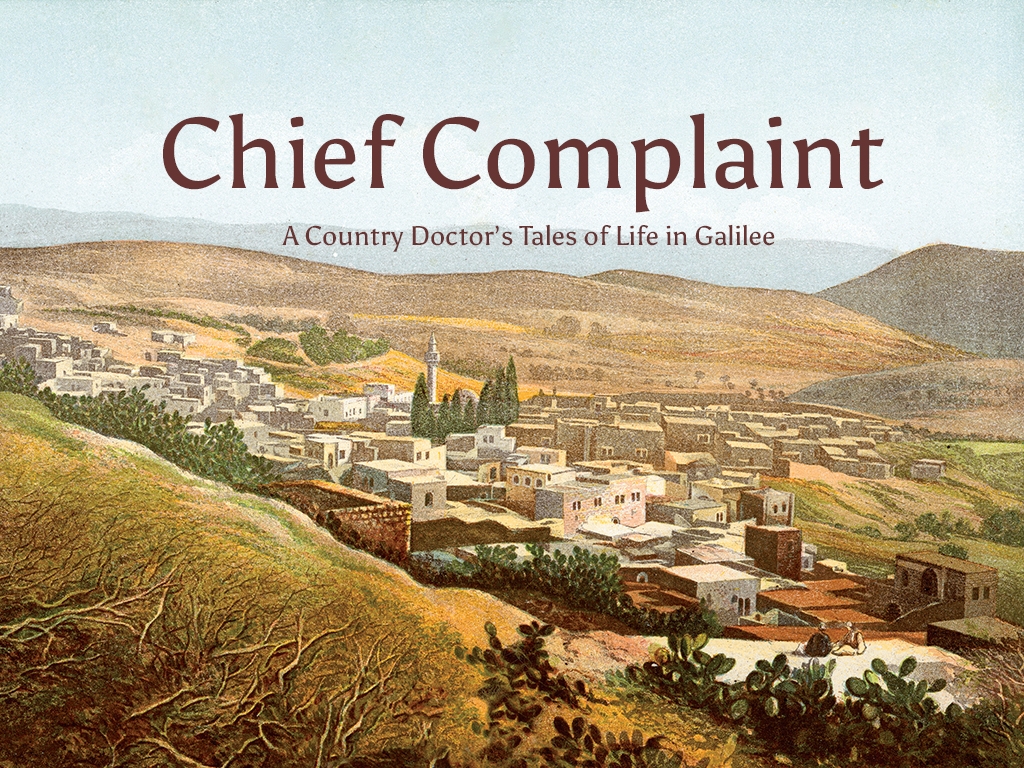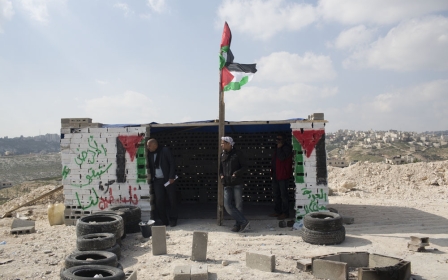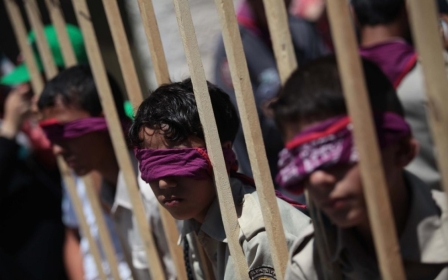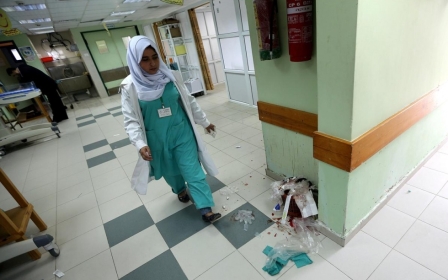BOOK EXCERPT: Chief Complaint: A Country Doctor’s Tale of Life in Galilee

This is an excerpt from the story “Limping” in Chief Complaint: A Country Doctor’s Tales of Life in Galilee, by Hatim Kanaaneh, published by Just World Books and serialised here by permission. Any requests to republish or reuse this text in any form should be addressed to [email protected]
Limping
By Hatim Kanaaneh
Oh podgy pot, I need you not,
My heart loves the goatherd
For shouting “tut!”
- A Palestinian ditty
Mayyada was born with congenital dislocation of the hip, a common enough condition to make its detection a standard part of the well-baby check-up routine by pediatricians and nurses at Family Health Centers, the official name we at the Ministry of Health proudly called our maternal and child health (MCH) clinics. Conceptually, we were charged with protecting and promoting the good health of every individual from birth until the end of life, in addition to maintaining the unity and good social health of the family and, beyond that, of the community as a whole. Such ambitious undertakings were actually practiced in the better-off neighborhoods of the major Jewish cities and in the collective farming communities such as the kibbutzim, the two centers of Zionist utopia where the best intentions, the most qualified manpower, and the largest budgets were invested. As you moved away from the hub, defined geographically and politically to coincide with Ashkenazi population centers, such idealistic and grandiose schemes gradually faded away. By the time you reached Palestinian villages in Galilee like Arrabeh, you were lucky to have any MCH services whatsoever.
There was a long history to this: All four major HMOs in the country had nationalist Zionist motives and motifs. For example, the largest, established by the Histadrut, the originally exclusivist Zionist labor union, banned Arabs from membership for many years. And one needed a steady source of income to pay the monthly membership fees. As an employee of the Ministry of Health, I raised the issue of the lack of health insurance coverage of fellow Arab residents with my superiors repeatedly, but to no avail. Then I changed my base for agitation to the civil society arena by establishing and leading the Galilee Society for Health Research and Services. We even contemplated establishing our own HMO and discovered, to our chagrin, that you needed to have such a step approved by the Israeli parliament, an obvious impossibility.
Still, I doubt if any of that had much to do with the passage in 1995 of the National Health Insurance Law. Reading the law, it sounded like the ultimate egalitarian socialist document. But the first step in its implementation revealed the deeply ingrained Jewish-centered essence of all state enterprises: there was not a single Arab among the scores of members of the Health Committee that oversaw its enactment. The inequalities in the health care system continued, especially at the periphery. In a country with a two-tier legal system and no constitution, not much more is to be expected. Ironically, health is the one field given by most defenders of the “Jewish and democratic state” as proof of its fairness.
But much of this came later and had little bearing on Mayyada’s story. The technicality of detecting a congenitally dislocated hip in a newborn is simple: You fold the supine baby’s two knees while clutching them in the palms of both hands and gently force the thighs apart by rotating them back and out at the hip joints. If one of the baby’s hips is congenitally dislocated, you feel a sudden click, one of those magic sensations that a healer never forgets once felt for the first time.
There are other signs that you look for, and the final diagnosis is confirmed by an x-ray. But the events I am recounting occurred in the early 1970s, when ultrasound, CT, and MRI were not commonly available. The trouble I faced in most such cases when I worked in the MCH clinics in Galilee was to convince the parents to follow up on the required treatment, a cast in the form of a pair of shorts for a few months for a baby who gives no outward sign of illness. This was doubly difficult because most parents had no medical insurance and the families’ financial means were limited, as was the situation with Mayyada’s parents at the time of her birth. The mother was not altogether convinced and disliked the idea of dealing with the demands of a baby in a cast, especially when she already had three other children. She consulted with a neighbor, a butcher by profession and bonesetter by avocation, who saw nothing wrong with the baby. When I tried to explain to him, in expectation of gaining his confidence in future cases, he was rather dismissive, informing me that he could easily wrench the hipbone of any baby out and it would of course make a clicking noise.
The real clincher in such cases comes when the baby starts walking and develops a limp. By this stage, the correction of the deformity requires orthopedic operative intervention. This was beyond the means and range of acceptance of this set of traditional parents; why submit a healthy baby to a major operation when, God willing, Mayyada would grow out of her (barely noticeable) walking problem with age? Twice, at first discovery and later when she was about five, I tried to enlist the help of the social worker in charge of the Battouf region. He couldn’t think of any way to influence the parents to change their decision and thought any harm that befalls the child later in her life would be due punishment for their stupidity and intransigence. “Believe me, I went specifically for this reason and had coffee with their neighbor, a good woman who is on good relations with the girl’s mother. But they don’t appreciate all of our hard work; they refused my advice. With our current budgets, advice is all I can offer, believe me.”
I found him of less help and not much more convinced or convincing than the butcher, who at least knew some anatomy. The reported visit to the neighbor was quite telling as well; she was the friendliest middle-aged single woman in the village who was reputed to curry influence with the Shin Bet, the police, the tax people, and most other government officials. When I brought up the subject with the parents and mentioned the neighbor, their only rhetorical comment was “I wonder what hour of the night he came visiting!”
The man’s qualifications for his job as the sole social worker for some 20,000 people also were less than impressive: he was a taxi driver who could read and write, though only barely. During one election year, he rented his vehicle and networking skills to an Orthodox Jewish religious political party that gained enough parliamentary seats for it to join the new government coalition and for one of its leaders to become the Minister of Social Welfare. Thus Abu Ghanim was anointed as social worker and put in charge of a region. This didn’t seem to raise many eyebrows.
“Our rural communities have emerged only five years ago from the heavy yoke of military rule to come under the no-less-oppressive and heavy-handed control of the Shin Bet and of an Arab-hating interior ministry official by the name of Israel Koenig,” the mayor of Arrabeh explained to me when I questioned the qualifications of the amateurish social worker. That was the first time I heard of Koenig. He would shortly acquire distinct notoriety among Palestinian citizens of Israel for the leaked memorandum he would submit to Prime Minister Rabin on how best to handle them. His itemized list ranged from more confiscation of their land to keeping them ignorant. This would rapidly gain him the position of Director General of the Ministry of the Interior. “Such autocrats do not expect or allow us to raise questions about whom they dispatch to work with us,” the mayor continued. “What do the ‘native rabble’ know about the role of social workers and the mysterious ways in which they are able to lighten the financial burden of the selected few that they decide to help?”
I suddenly understood why a neighbor once asked me with casual confidence to do him a favor, a request I found puzzling at the time. His daughter had failed her exams and was dismissed from high school; he asked me to “appoint” her as a nurse. He must have assumed that I was part of “the system” and that doing such favors was within my powers and quite appropriate. He demurely hinted at a payment of sorts.
•
… One evening a few years after Mayyada had dropped out of school, Taha came to my clinic asking for a medical certificate attesting to Mayyada’s physical disability. As a disabled adult, she qualified for a monthly social security support payment.
“Is Mayyada already eighteen?” I marveled. “It seems like only yesterday that I was trying to convince you to take her to the hospital!”
“Yes, she turned eighteen this afternoon,” Taha answered. “Ya‘ni, what can we do? It is God’s will. And now we can get a little cash from the government each month to help the family along.”
“Hopefully she will be able to use some of it herself,” I said intruding. “You know, that is the purpose of the monthly payment. It is to help her, not for you to spend on tobacco and coffee.”
“That is true,” he said with an edge of discomfort and objection in his voice. “But you know, with a large family like I have, we need to help each other to manage. Barkat Allah. They are too many. Without the child support monthly check, it would be impossible for all of us to survive. Yikhlif ‘ala al-ta’meen! Now we are surviving, and with the three older boys working with their cousins in construction, I am putting some cash aside to build houses for them.”
God’s blessing for his large family, and thank God for Social Security. Other patients were waiting. I proceeded to fill the standard form I had for the required disability certificate.
“Which side is the bad hip?” I asked, trying to visualize the young woman walking, but failing to remember the side on which she limped. He thought about it, then shook his head.
“You got me there, Doctor! You know I love her more than all her sisters. Believe me, I do not see her as a lame person. I can’t tell which side is the bad hip. To me she is good all over; she has no defect. But if you need to write it down, I’ll tell you in a couple of minutes. By now she is probably asleep with her sisters on their mattresses. I will go check for you.”
With that, he left and another patient came in.
This was the first time I had met the psychological denial of disability not by the disabled but by a close family member. Later I noticed the same phenomenon in the drawings of a gifted grandnephew of mine. By age five, Hassan was able to draw a portrait that carried an unmistakable likeness of the subject. When Ahmad, my older brother and Hassan’s grandfather, passed away, Hassan was obsessed with drawing him from memory. None of the figures he produced showed Ahmad’s disability, a paralyzed and atrophied left upper extremity. When I pointed that out, Hassan argued that he never knew that his grandfather was disabled.
Mayyada’s home was not far from the clinic. Shortly after he left, Taha barged in, panting.
“It is the hip on the outer side of the mattress, Doctor,” he told me. “Not the one next to the wall.”
“You know what? I’ve decided to see Mayyada. Bring her in tomorrow, please!”
New MEE newsletter: Jerusalem Dispatch
Sign up to get the latest insights and analysis on Israel-Palestine, alongside Turkey Unpacked and other MEE newsletters
Middle East Eye delivers independent and unrivalled coverage and analysis of the Middle East, North Africa and beyond. To learn more about republishing this content and the associated fees, please fill out this form. More about MEE can be found here.




